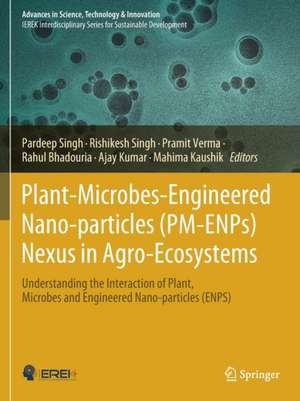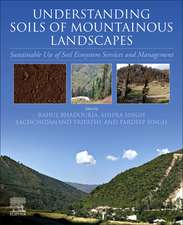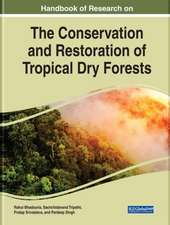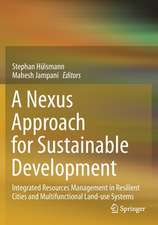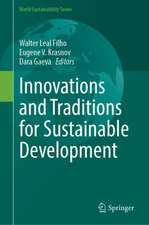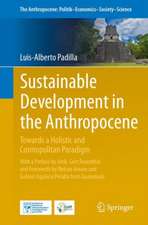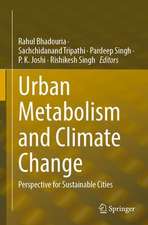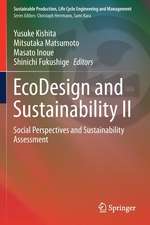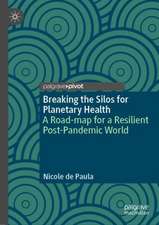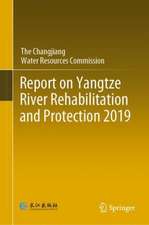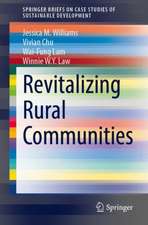Plant-Microbes-Engineered Nano-particles (PM-ENPs) Nexus in Agro-Ecosystems: Understanding the Interaction of Plant, Microbes and Engineered Nano-particles (ENPS): Advances in Science, Technology & Innovation
Editat de Pardeep Singh, Rishikesh Singh, Pramit Verma, Rahul Bhadouria, Ajay Kumar, Mahima Kaushiken Limba Engleză Paperback – 23 mar 2022
This book presents a collection of cross-disciplinary research, with contributions addressing all key features of the plant/microbe/ENP nexus in agro-ecosystems. The uptake, transport and transformation of nanoparticles in plants have attracted more and more attention in the past several years. Especially, the impact of Engineered Nanoparticles (ENPs) on bioprocesses; low-, medium- and high-level dose responses in the microbial community of soil; and long-, medium- and short-term exposure responses, particularly microbial nitrogen transformations, are just a few of the aspects involved. Since ENPs are used in many industries, including cosmetics, agriculture, medicine, food technology and waste management, their transport through biogeochemical cycles is an important focus of many studies today.
Specifically, ENP–microbe interaction has been analysed with regard to disease treatment for plants; it plays a vital role in disease inhibition by releasing metalions that act through many pathways – e.g. reactive oxygen species (ROS) generation, DNA transformation and disruption of the cell cycle – to stop cell growth in the pathogen. Due to these properties, ENPs are also used as slow release or delayed release pesticides and fungicides, and as carrier systems for growth-promoting hormones. Despite their multiple uses in various industries, the negative effects of ENPs are still a major concern for the scientific community and consumers alike. For example, their transport to various food chains has been reported to have adverse effects. This raises a degree of doubt concerning a rapidly growing scientific field with major applications in many industries.
From a sustainable development perspective and particularly to ensure food security in light of the uncertainty accompanying climate change, it is imperative to address this divergence by focusing on the plant/microbe/ENP nexus.
| Toate formatele și edițiile | Preț | Express |
|---|---|---|
| Paperback (1) | 392.60 lei 6-8 săpt. | |
| Springer International Publishing – 23 mar 2022 | 392.60 lei 6-8 săpt. | |
| Hardback (1) | 384.45 lei 38-45 zile | |
| Springer International Publishing – 23 mar 2021 | 384.45 lei 38-45 zile |
Din seria Advances in Science, Technology & Innovation
- 18%
 Preț: 2114.60 lei
Preț: 2114.60 lei - 20%
 Preț: 1081.52 lei
Preț: 1081.52 lei - 18%
 Preț: 1254.36 lei
Preț: 1254.36 lei - 18%
 Preț: 1243.29 lei
Preț: 1243.29 lei - 18%
 Preț: 799.79 lei
Preț: 799.79 lei - 18%
 Preț: 1566.90 lei
Preț: 1566.90 lei - 18%
 Preț: 2135.11 lei
Preț: 2135.11 lei - 18%
 Preț: 1699.47 lei
Preț: 1699.47 lei - 18%
 Preț: 1248.02 lei
Preț: 1248.02 lei - 15%
 Preț: 653.14 lei
Preț: 653.14 lei - 15%
 Preț: 666.24 lei
Preț: 666.24 lei - 18%
 Preț: 1677.26 lei
Preț: 1677.26 lei - 18%
 Preț: 1444.55 lei
Preț: 1444.55 lei - 15%
 Preț: 653.14 lei
Preț: 653.14 lei - 18%
 Preț: 1248.20 lei
Preț: 1248.20 lei - 18%
 Preț: 1233.83 lei
Preț: 1233.83 lei - 18%
 Preț: 1565.29 lei
Preț: 1565.29 lei - 18%
 Preț: 1403.52 lei
Preț: 1403.52 lei - 18%
 Preț: 1121.76 lei
Preț: 1121.76 lei - 18%
 Preț: 1400.35 lei
Preț: 1400.35 lei - 18%
 Preț: 1392.46 lei
Preț: 1392.46 lei - 18%
 Preț: 1121.76 lei
Preț: 1121.76 lei - 18%
 Preț: 1405.09 lei
Preț: 1405.09 lei - 15%
 Preț: 653.14 lei
Preț: 653.14 lei - 18%
 Preț: 1834.58 lei
Preț: 1834.58 lei - 18%
 Preț: 948.92 lei
Preț: 948.92 lei - 15%
 Preț: 648.24 lei
Preț: 648.24 lei - 18%
 Preț: 1230.66 lei
Preț: 1230.66 lei - 15%
 Preț: 704.69 lei
Preț: 704.69 lei - 20%
 Preț: 1167.33 lei
Preț: 1167.33 lei - 18%
 Preț: 1866.00 lei
Preț: 1866.00 lei - 18%
 Preț: 1128.08 lei
Preț: 1128.08 lei - 18%
 Preț: 972.62 lei
Preț: 972.62 lei - 18%
 Preț: 967.40 lei
Preț: 967.40 lei - 18%
 Preț: 900.80 lei
Preț: 900.80 lei - 18%
 Preț: 1008.12 lei
Preț: 1008.12 lei - 15%
 Preț: 646.62 lei
Preț: 646.62 lei - 18%
 Preț: 1128.08 lei
Preț: 1128.08 lei - 18%
 Preț: 1402.35 lei
Preț: 1402.35 lei - 18%
 Preț: 1576.37 lei
Preț: 1576.37 lei - 15%
 Preț: 601.60 lei
Preț: 601.60 lei - 18%
 Preț: 1211.72 lei
Preț: 1211.72 lei - 20%
 Preț: 673.17 lei
Preț: 673.17 lei - 15%
 Preț: 651.51 lei
Preț: 651.51 lei - 18%
 Preț: 1242.83 lei
Preț: 1242.83 lei - 18%
 Preț: 1248.68 lei
Preț: 1248.68 lei - 18%
 Preț: 1233.83 lei
Preț: 1233.83 lei - 18%
 Preț: 1587.39 lei
Preț: 1587.39 lei - 18%
 Preț: 1241.73 lei
Preț: 1241.73 lei - 5%
 Preț: 1322.29 lei
Preț: 1322.29 lei
Preț: 392.60 lei
Nou
Puncte Express: 589
Preț estimativ în valută:
75.12€ • 78.43$ • 62.17£
75.12€ • 78.43$ • 62.17£
Carte tipărită la comandă
Livrare economică 04-18 aprilie
Preluare comenzi: 021 569.72.76
Specificații
ISBN-13: 9783030669584
ISBN-10: 3030669580
Pagini: 215
Ilustrații: X, 215 p. 48 illus., 46 illus. in color.
Dimensiuni: 210 x 279 mm
Greutate: 0.52 kg
Ediția:1st ed. 2021
Editura: Springer International Publishing
Colecția Springer
Seria Advances in Science, Technology & Innovation
Locul publicării:Cham, Switzerland
ISBN-10: 3030669580
Pagini: 215
Ilustrații: X, 215 p. 48 illus., 46 illus. in color.
Dimensiuni: 210 x 279 mm
Greutate: 0.52 kg
Ediția:1st ed. 2021
Editura: Springer International Publishing
Colecția Springer
Seria Advances in Science, Technology & Innovation
Locul publicării:Cham, Switzerland
Cuprins
Engieered Nanoparticles (ENPs) in Agricultural Revolution: An Enticing Domain to Move Carefully.- Nanotechnology: Advancement for Agricultural Sustainability.- Nanotechnology for sustainable crop production: recent development and strategies.- Interaction of Titanium dioxide nanoparticles with Plants in Agroecosystems.- Interaction of nano-TiO2 with plants: Preparation and translocation.- Plant physiological responses to engineered nanoparticles.- Engineered nanoparticles in agro-ecosystems: implications on the soil health.- Effect of engineered nanoparticles on soil attributes and potential in reclamation of degraded lands.- Advances of Engineered Nanofertilizers for Modern Agriculture.- Nano-fertilizers and Nano-pesticides as Promoters of Plant Growth in Agriculture.- Bio-nanosensors: Synthesis and their substantial role in agriculture.
Notă biografică
Dr. Pardeep Singh
Dr. Pardeep singh is presently working as Assistant professor (Department of Environmental Science PGDAV College, University of Delhi, New Delhi, India. He has obtained his Master Degree from Department of Environmental Science, Banaras Hindu University, Varanasi, India. He obtained his doctorate degree from Indian Institute of Technology (Banaras Hindu University), Varanasi. He has published more than 55 papers in the reputed International journals in the fields of waste management, nano-material synthesis and applications, photochemical waste degradation and management, soil C dynamics.
Mr. Pramit Verma
Mr. Pramit Verma is currently working as Senior Research Fellow at Institute of Environment & Sustainable Development, Banaras Hindu University, Varanasi. He has done his M. Phil from the same Institute in 2014. He is currently working in the field of Urban Ecology. He has also worked in the fieldof urban climate disaster risk reduction and management. He has published a research article and a technical report while participating in various national and international conferences, workshops and seminars. He is also working on the socioeconomic dynamics governing urban energy and urban land use in secondary cities of India.
Dr. Rishikesh Singh
Dr. Rishikesh Singh is working as a Senior Research Scholar at the Institute of Environment & Sustainable Development, Banaras Hindu University, Varanasi, India. He completed his M. Phil from Central University of Punjab, Bathinda, India and PhD degree from Institute of Environment & Sustainable Development, Banaras Hindu University. The area of his doctoral research is impact analysis of agronomic practices. He has published more than 40 research and review papers in leading International Journals.
Dr. Rahul Bhadouria
Dr. Rahul Bhadouria is presentlyworking as Post-Doctoral Researcher at University of Delhi, New Delhi, India. He obtained his doctorate degree form Department of Botany, Banaras Hindu University, Varanasi in the year of 2017. The area of his doctoral research is performance evaluation of tree seedling growth under dry tropical environment. He has published more than 15 papers and 6 book chapters in the Internationally reputed journals of ecology and related areas/reputed publishers. His current research projects are 'Management of Soil C Dynamics to Mitigate Climate Change', 'A perspective on tree seedling survival and growth attributes in tropical dry forests under the realm of Climate Change' and ‘Understanding of plant community assembly, functional diversity and soil attributes of savannas through forest-savanna-grassland continuum approach’. He is subject expert reviewer in the journal published by Elsevier, Springer and Taylor and Francis groups (such as Ecological Indicator, Plant Physiologyand Biochemistry, Tropical Ecology, Journal of Environment and Forestry Research and Agroforestry Systems).Textul de pe ultima copertă
This book presents a collection of cross-disciplinary research, with contributions addressing all key features of the plant/microbe/ENP nexus in agro-ecosystems. The uptake, transport and transformation of nanoparticles in plants have attracted more and more attention in the past several years. Especially, the impact of Engineered Nanoparticles (ENPs) on bioprocesses; low-, medium- and high-level dose responses in the microbial community of soil; and long-, medium- and short-term exposure responses, particularly microbial nitrogen transformations, are just a few of the aspects involved. Since ENPs are used in many industries, including cosmetics, agriculture, medicine, food technology and waste management, their transport through biogeochemical cycles is an important focus of many studies today.
Specifically, ENP–microbe interaction has been analysed with regard to disease treatment for plants; it plays a vital role in disease inhibition by releasing metalions that act through many pathways – e.g. reactive oxygen species (ROS) generation, DNA transformation and disruption of the cell cycle – to stop cell growth in the pathogen. Due to these properties, ENPs are also used as slow release or delayed release pesticides and fungicides, and as carrier systems for growth-promoting hormones. Despite their multiple uses in various industries, the negative effects of ENPs are still a major concern for the scientific community and consumers alike. For example, their transport to various food chains has been reported to have adverse effects. This raises a degree of doubt concerning a rapidly growing scientific field with major applications in many industries.
From a sustainable development perspective and particularly to ensure food security in light of the uncertainty accompanying climate change, it is imperative to address this divergence by focusing on the plant/microbe/ENP nexus.
Caracteristici
Addresses nanoparticles in agro-ecosystems, with special emphasis on the nature of nanoparticles Explores the fate and transport of nanoparticles in plant systems, mediated by microbial communities Focuses on the microbial immobilization and degradation of nanoparticles in agro-ecosystems
